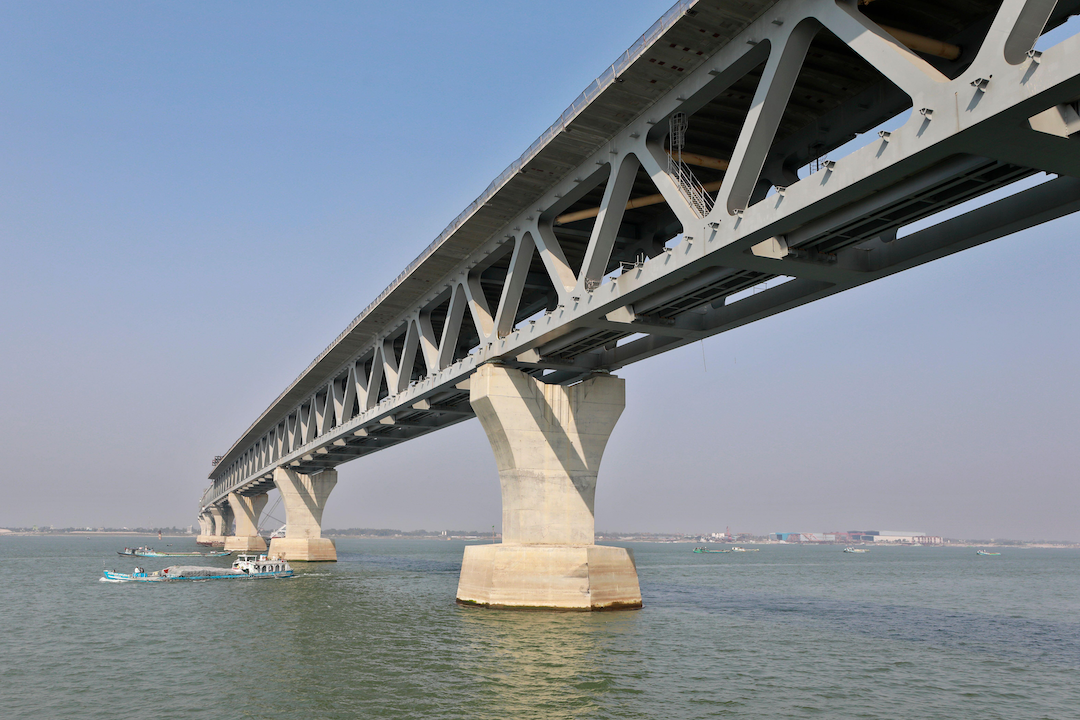Dunking Yunus
Sheikh Hasina hopes people will forget the real reason behind the cancellation of the World Bank Padma Bridge loan.

On May 18th, at an Awami League discussion meeting, Sheikh Hasina, the Bangladeshi prime minister, blamed Muhammad Yunus — Nobel Peace Prize laureate and former managing director of Grameen Bank — for the decision of the World Bank on June 29th 2012 to cancel the $1.2 billion funding it had previously approved for the Padma Bridge.
Hasina said:
He [Yunus] blocked the funds for Padma bridge merely for the post of MD [Managing Director]. He should be plunged into the Padma River twice. He should just be plunged in a bit and then pulled up so that he does not die, and then pulled up onto the bridge. That perhaps will teach him a lesson. [Yunus] stopped the funding for Padma bridge. Why? So he could hold onto the post of Grameen Bank MD.
Observers of Bangladeshi politics should not be too surprised by Sheikh Hasina’s comments, as they achieve two things.
First, they help conceal the real reason for the blocking of the funds — alleged corruption in the bidding for World Bank funds and the failure of the government to deal with it.
And second, it allows her to blame her bête noire, Muhammad Yunus — someone whom, rather extraordinarily, she obviously sees as her rival.
For those interested in facts, it is worthwhile looking at the actual reasons given by the World Bank for blocking the funds.
This was set out in its press statement published at the time:
The World Bank has credible evidence corroborated by a variety of sources which points to a high-level corruption conspiracy among Bangladeshi government officials, SNC Lavalin executives, and private individuals in connection with the Padma Multipurpose Bridge Project.
The World Bank provided evidence from two investigations to the prime minister, as well as the minister of finance and the chairman of the Anti -Corruption Commission of Bangladesh (ACC) in September 2011 and April 2012. We urged the authorities of Bangladesh to investigate this matter fully and, where justified, prosecute those responsible for corruption. We did so because we hoped the government would give the matter the serious attention it warrants.
In Canada, where SNC Lavalin’s headquarters are located, after executing numerous search warrants and a year-long investigation based on a referral from the World Bank, the Crown Prosecution Services brought corruption charges against two former SNC executives in connection with the Padma Bridge Project. Investigation and prosecution are ongoing but the court filings to date underscore the gravity of this case.
Because we recognize the importance of the bridge for the development of Bangladesh and the region, we nonetheless proposed to proceed with an alternative, turnkey-style implementation approach to the project provided the government took serious actions against the high level corruption we had unearthed. It would be irresponsible of the bank not to press for action on these threats to good governance and development.
To be willing to go forward with the alternative turnkey-style approach, we sought the following actions: (i) place all public officials suspected of involvement in the corruption scheme on leave from government employment until the investigation is completed; (ii) appoint a special inquiry team within the ACC to handle the investigation, and (iii) agree to provide full and adequate access to all investigative information to a panel appointed by the World Bank comprised of internationally recognized experts so that the panel can give guidance to the lenders on the progress, adequacy, and fairness of the investigation. We worked extensively with the government and the ACC to ensure that all actions requested were fully aligned with Bangladeshi laws and procedures.
We proposed that when the first bids would be launched, the bank and the co-financiers would decide to go ahead with project financing if they had determined, based on the panel’s assessment, that a full and fair investigation was underway and progressing appropriately.
In an effort to go the extra mile, we sent a high-level team to Dhaka to fully explain the bank’s position and receive the government’s response. The response has been unsatisfactory.
The World Bank cannot, should not, and will not turn a blind eye to evidence of corruption. We have both an ethical obligation and a fiduciary responsibility to our shareholders and IDA donor countries. It is our responsibility to make sure IDA resources are used for their intended purposes and that we only finance a project when we have adequate assurances that we can do so in a clean and transparent way. In light of the inadequate response by the government of Bangladesh, the World Bank has decided to cancel its $1.2 billion IDA credit in support of the Padma Multipurpose Bridge project, effective immediately.
It is absurd to think that Yunus — or indeed Mahfuz Anam, the editor of The Daily Star whom the prime-minister makes a co-conspirator in the loan cancellation — had any role in such a decision by the World Bank.
The prosecution in Canada finally did not proceed, as the trial court held the wire-tapping evidence — that was crucial to substantiate the allegations of criminal offences — was considered not to have been properly authorised by a previous judge. However, this should not in any way be seen as an exoneration of corruption — in fact the Bangladeshi government caught a lucky break, as it meant that the evidence contained in the wire-taps never saw the light of day.
Evidence of corruption, however, there certainly was. The government did not respond to World Bank entreaties to investigate. The prime minister put her foot down — and did not want to bow down to the World Bank. And as a result, it was forced to rescind its loan.●
/David Bergman